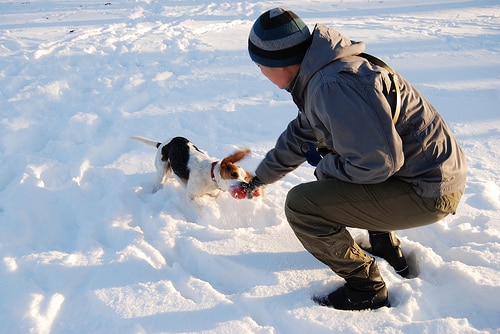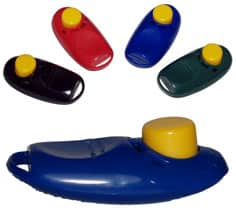Clicker Training Toronto
Search Google, Reddit, Instagram, TikTok, and Facebook, and you’ll see consensus that Clicker Training is the way to go. Find out why you don’t want your dog to miss out on this powerful teaching tool.

Methods we use at When Hounds Fly
Dog training is a totally unregulated industry, which means that anyone, regardless of their knowledge, experience, or credentials, can open a dog training business. As a result, this industry is full of either a) self-taught dog trainers that use harmful methods and give harmful advice or b) old-fashioned dog trainers that haven’t invested in education, so they continue to use outdated, less effective, and painful training methods.
If a dog trainer’s web site does not explicitly state what their methods are, or do not include video actually showing the process of training, be cautious. We are proud of how happy our students and their dogs look in class, so we welcome prospective students to come watch a class, and our YouTube channel has a plethora of videos showing classes and training.
Tools we use:
- Food rewards
- Toys
- Praise
- Clicker
Tools we do NOT use:
- Leash corrections (on any collar – flat, martingale, choke, or prong)
- Shock collars (e-collars)
- Spray bottles
- Scary noises (tossing bags full of chains or coins at dogs)
- Physical corrections (pokes, jabs, smacks, pinches, kicks)
- Yelling and intimidation (growling at dogs, staring dogs down)
Playing Tug of War is a great reward for good behaviour. And it’s amazing exercise, satisfies Elmo’s prey drive, and strengthens the bond between dog and owner!
Clicker Training – The Tool of Choice
When Hounds Fly first opened in January 2010. When we first opened, a handful of our first students sought us out because of our expertise in clicker training. Most had never heard of it. Over fifteen years later, and after over 16,000 dogs have taken class here, inquiring students specifically ask IF we use clickers – because that’s now become the tool of choice thanks to our students’ hard work AND the impressive results they achieved. Our students’ dogs are the collective proof that clicker training is the best way to effectively train while creating the strongest bond between you and your dog.
Common Questions About Clicker Training
Question: Do I have to carry a clicker with me forever, or else my dog won't listen?
Answer: No, clickers are only used during the teaching process. Once a behaviour is learned, the clicker is not needed.
Question: If I train with food rewards, do I need to have food with me at all times, or else my dog won't listen?
Answer: No, in the end, you will not need to give your dog a treat for every good behaviour. Initially, we are very generous with our rewards. As the dog starts learning and gets better, we carefully reduce the frequency of their food rewards. Also, we are creative in our use of “life rewards” to reward good behaviour. That could be something as obvious as a toy, but as abstract as permission to go sniff, or simply getting a good belly rub.
Question: Will my dog beg people for food?
Answer: On the contrary – we find that dogs that are trained with food DON’T beg for food. Dogs who mug people for food are usually the ones that aren’t trained (properly) with food. Dogs trained with food know how to earn it – and it’s not by being pushy!
Question: Clicker trainers - they're too permissive on their dog. I'm worried they'll know how to do tricks - but will they have good manners?
Answer: Since nobody wants to carry around a ton of food forever, ourselves included, we use everything else that the dog wants in life to reinforce training. If our dogs don’t go into their crate and lay down, they don’t eat. If they don’t sit and stay while we open the door, the door never opens. If they don’t keep the leash loose while we are walking towards the dog park, we never get to the dog park. We have high expectations of our dogs.
What is true though is we will never use physical punishment in training because it is unnecessary – you can train reliable behaviours and good manners without having to resort to violence.


